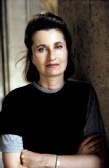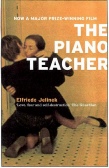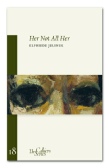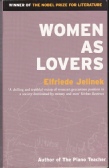


CANADA Exclusive
Mariánska 12
811 08 Bratislava
Slovak Republic
Tel.: +421 252 932
895
Fax: +421 252 932 896
Cell: +421 911 424 435
[email protected]
A L L R I G H T S R E S E R V E D © 2 0 1 4 C A N A D A E X C L U S I V E
D e s i g n R A Y P H O T O s t u d i o, C r e a t e d b y WEB -
ELFRIEDE JELINEK -
Why did you become a writer? Who inspired you?
As is said about most writers: on the one hand all I ever did from when I was a child
was read, and I was a loner, which was furthered by my parents and my upbringing.
On the other hand, the more I read, the more I felt this well-
Some time has now passed since the announcement that you have been awarded the Nobel Prize in Literature for 2004. Do you think this will affect your future writing?
I have the feeling it will influence my future writing to the extent that without any material worries I could develop a greater ease, even light heartedness, in my writing. That might be good for my language process, which as I said tends to be compositional. It could draw from a greater reservoir of freedom. The irony could develop an even greater ease.
What role has Internet had for you as a writer?
Internet is exemplary for me. I do not want to have the feeling of writing “for eternity,” so to speak. The fleetingness of the Internet has therefore become very attractive to me. At some point I set up a heading on my homepage called “Notizen,” or “Notes,” in which I try to capture the fleetingness of jotting things down, similar to emails, which on the one hand acknowledges current events but on the other hand is not carved in stone. Instead it is more like something you write in wet sand with your finger. You can remove it at any time, whereas a book is more an object that “remains,” as it were, something you hold in your hand.
In your opinion what is the most pressing social issue in Western society today?
That is very difficult to answer. I think isolation is one of the greatest problems,
an ever-
As a Nobel Laureate you will have the opportunity to nominate for the Nobel Literature Prize in the future. What kind of literature would you like to see awarded a Nobel Prize?
Literature that keeps employing new linguistic and formal modes of expression to
draft a panorama of society as a whole while at the same time exposing it, tearing
the masks from its face -
Why do you suppose European artists are so much more politically engaged than American ones?
The smaller a group, the easier it is for more people to argue and enter into discussions. The U.S. is vast. It's too large. The intellectuals hide out in enclaves, in big cities or universities, like a bunch of chickens hiding from a fox.
Much of your criticism has been aimed at your native Austria and its ''criminal'' Nazi past.
In Austria, a rather authoritarian Catholic country, the role of the social admonisher traditionally fell to artists because there were no great political thinkers.
Yet your novels, like ''Lust'' and ''Women as Lovers,'' focus on sexual politics.
I describe the relationship between man and woman as a Hegelian relationship between master and slave. As long as men are able to increase their sexual value through work, fame or wealth, while women are only powerful through their body, beauty and youth, nothing will change.
How can you cling to such dated stereotypes when you yourself are acclaimed internationally for your intellect?
A woman who becomes famous through her work reduces her erotic value. A woman is permitted to chat or babble, but speaking in public with authority is still the greatest transgression.
You're suggesting that your achievements, like winning the Nobel Prize in Literature, detract from your overall appeal.
Certainly! A woman's artistic output makes her monstrous to men if she does not know to make herself small at the same time and present herself as a commodity. At best people are afraid of her.
Is there any point in life when a woman grows too old to care about attracting male attention?
Yes, of course. But the tragedy begins when a distinguished older woman becomes a slave to a younger man.
This is the story you tell in ''The Piano Teacher,'' which was based on your own life. You trained as a musician and lived with your hypercritical mother in a house in Vienna.
I still live in that house, but my mother died four years ago. I used to commute back and forth between Vienna, where we lived, and Munich, where my husband lives. I still do it that way. A tale of two cities.
Why doesn't your husband move to Vienna to be with you?
Because I need to have a second home in another city. I have to be able to escape from Vienna as often as I like. That's why the home in Munich is almost more important to me than it is to my husband, who is fond of Munich because he grew up there.
Have you ever visited the Canada?
No, never. It's very difficult for me to travel and particularly to fly. Perhaps I'll take a boat to New York City one day. I'm just afraid that the speed and noise would make me mad as soon as I set foot on land.
Interview by Marika Griehsel and DEBORAH SOLOMON





s p e c i a l


